Partners
The Global Commission on Drug Policy
The Global Commission on Drug Policy was established in 2011 by political leaders, cultural figures, and globally influential personalities from the financial and business sectors. The Global Commission currently comprises former Heads of State and former high-level officials of the United Nations. Its mission is to promote evidence-based drug policy reforms at international, national and regional levels – reforms which address issues of public health and social integration, with a strict regard for human rights.
The Global Commission carries out this role through the publication every year of a comprehensive, detailed, evidence-based policy report, as well as through high-level diplomatic activity at the bilateral and multilateral levels.
Reports by the Global Commission on Drug Policy
The members of the Global Commission are supported by a secretariat based in Geneva, Switzerland.

The West Africa Commission on Drugs

With the support of leading experts and the Kofi Annan Foundation, the West Africa Commission on Drugs was formed in 2013. One year later, the Commissioners delivered a set of comprehensive policy recommendations and an authoritative report: ‘Not Just in Transit’. The report was the culmination of one and a half years of engagement by the Commission with national, regional and international parties, including the African Union (AU), the Economic Community of West African States (ECOWAS) and the United Nations Office on Drugs and Crime (UNODC). It was informed by a series of background papers, drafted by leading experts from Africa and beyond.
The Commission’s findings and recommendations kick-started policy discussions, reviews and reforms across West Africa, while Commissioners continue to engage in follow-up advocacy and high-level engagements with governments, regional and international bodies, and the media – supported by local civil society partners. In 2018, the Commission launched a second report: a Model Drug Law for West Africa which seeks to demonstrate how their recommendations can be translated into national legislation.